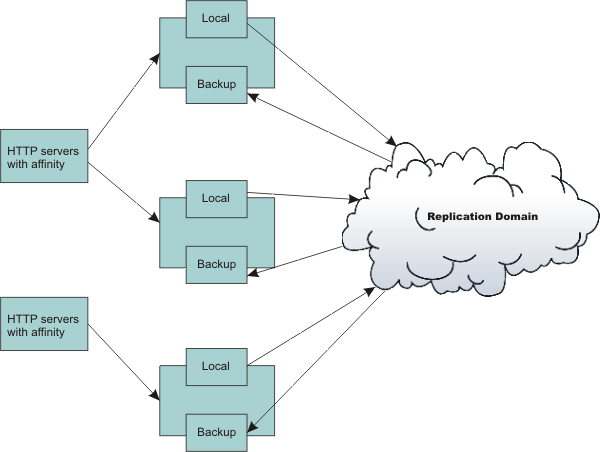Network Deployment (Distributed operating systems), v8.0 > Applications > Web applications > Sessions > Memory-to-memory replication
Memory-to-memory topology: Peer-to-peer function
The basic peer-to-peer (both client and server function, or both mode) topology is the default configuration and has a single replica. However, you can also add additional replicas by configuring the replication domain.

In this basic peer-to-peer topology, each server Java Virtual Machine (JVM) can:
- Host the web application leveraging the HTTP session
- Send out changes to the HTTP session that it owns
- Receive backup copies of the HTTP session from all of the other servers in the cluster
This configuration represents the most consolidated topology, where the various system parts are collocated and requires the fewest server processes. When using this configuration, the most stable implementation is achieved when each node has equal capabilities (CPU, memory, and so on), and each handles the same amount of work.
It is also important to note that when using the peer-to-peer topology, replication must be possible within the replication domain for session data access and invalidation to occur properly. There must be 2 or more cluster members up at all times for a given replication domain. For example, if we have a cluster of 2 application servers, server1 and server2, that are both configured in the peer-to-peer mode and server2 fails. All of backup information for server1 is lost and replication is no longer possible.
Session hot failover
A new feature called session hot failover has been added to this release. This feature is only applicable to the peer-to-peer mode. In a clustered environment, session affinity in the WAS plug-in routes the requests for a given session to the same server. If the current owner server instance of the session fails, then the WAS plug-in routes the requests to another appropriate server in the cluster. For a cluster configured to run in the peer-to-peer mode this feature causes the plug-in to failover to a server that already contains the backup copy of the session, therefore avoiding the overhead of session retrieval from another server containing the backup. However, hot failover is specifically for servant region failures. When an entire server, meaning both controller and server fail, sessions may have to be retrieved over the network.
We must upgrade all WAS plug-in instances that front the Application Server cluster to version 6.0 to ensure session affinity when using the peer-to-peer mode.
Memory-to-memory replication
Memory-to-memory topology: Client/server function
Memory-to-memory session partitioning
Configure memory-to-memory replication for the peer-to-peer mode (default memory-to-memory replication)
Configure memory-to-memory replication for the client/server mode
Related
Replication domain collection
 Concept topic
Concept topic